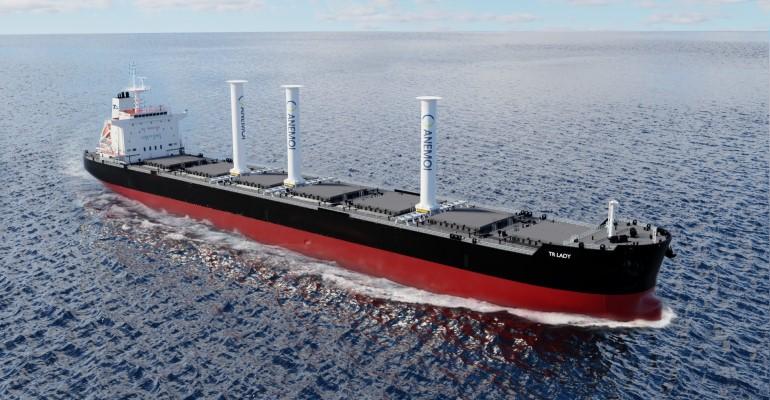A consortium of companies backed by EU funding are set to take a holistic view of wind-propelled vessels to improve efficiency gains.
The Optiwise project has funding from the Horizon Europe research programme and aims to demonstrate energy savings using wind propulsion and hydrodynamic improvements in propulsion.
The EUR5.3m project will be co-ordinated by the Maritime Research Institute Netherlands (MARIN) in partnership with Euronav, Wärtsilä Netherlands, Core IC, Ayro, Chantiers de l’Atlantique, Flikkema Innovation Management & Consultancy, Universita Degli Studi Di Geneva and Anemoi Marine Technologies.
“Wind propulsion is so far mostly applied without re-considering the overall ship design and operations. Whereas that fits within a “business as usual” scenario, it does limit the attainable savings. With Optiwise we are building on R&D already under development among the consortium partners in the last years and re-thinking the design process and energy management of ships with wind propulsion, while still making sure that these ships conform to common operational and regulatory requirements. We thereby expect to enable and showcase much higher savings than what can be seen in the present market applications” said Rogier Eggers, Project Manager at MARIN.
Optwise will focus on three operational use cases in a bid to develop methods applicable to most of the world fleet: a bulk carrier with Anemoi Rotor Sails, a tanker with Ayro OceanWings and a passenger ship with solid sails from Chantiers de l’Atlantique.
The project will involve extensive simulation, basin tests, bridge simulations and land-based wind propulsion tests.
Following an EU call for technologies that bring 10% energy savings for a single measure and 20% for combined measure, Optiwise set a higher ambition: “Our overall ambition is to develop and employ holistic design and control methods for ground-breaking new ship concepts utilising wind propulsion while considering realistic operational scenarios. With these methods we expect to realise average energy savings between 30% and 50% when compared to equivalent conventional ships while ensuring operational feasibility in a realistic wind climate.”
The project deliverables are an integrated vessel system optimisation with wind propulsion, and smart measurement and control for best operation of the vessels.
“We are aware of the huge challenge that the maritime industry is facing to reduce its Green House Gas emissions according to the IMO ambition, and the gradually introduced regulations to advance this effort. Zero emission fuels are assumed to be the main solution. However, sufficient and affordable supply of such fuels is highly uncertain for the foreseeable future, which means that energy saving on board is expected to be increasingly important, both environmentally and economically. We expect that the knowledge built through such R&D efforts will benefit the waterborne industry in its decarbonisation journey.” said Konstantinos Papoutsis of Euronav.
Source: Seatrade Maritime News






